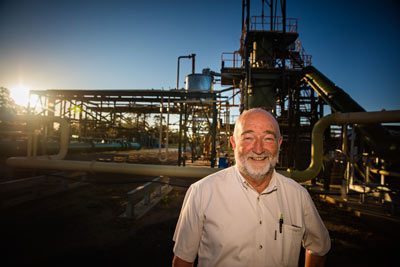Tyre recycler Green Distillation Technologies, which has developed world-first technology that transforms old tyres into oil, carbon and steel, has moved to try and remove some of the confusion about how their process is described.

Their Chief Operating Officer Trevor Bayley has said that many people have described their process as ‘pyrolysis’ although there are very significant differences between what they do and what most people understand pyrolysis to be.
“Pyrolysis is a generic term used to describe a process and is defined by Wikipedia as the thermal decomposition of a substance in an inert atmosphere and it goes on to say that it can be alternatively known by a number of names, including ‘Destructive Distillation’, which is the term we use to describe our process.
“Charcoal has been made by pyrolysis for thousands of years where the air to the burning wood is restricted, while coke is the result of pyrolyzing coal and carbon black from pyrolyzing oil.
“When it comes to old tyres the charcoal, coke and oil examples have been treated as the starting point and the results of the process are a liquid, char, some gas and a residual ash, as the steel bead and reinforcing are usually removed at the start.
“This process has been refined and improved in advanced countries in Europe and the United States, but the major problem is that the liquid and carbon are of poor quality. In India and China a cut-price approach has meant that there are also significant greenhouse gas emissions that would be banned in Western Counties including Australia.
“Tyre derived fuel is also used as an oil or coal replacement in these and some other countries and this also creates noxious greenhouse gas emissions and is a waste of what should be an important energy resource”, he said.
Trevor Bayley said that the process pioneered by Green Distillation Technologies was developed from basic chemistry and the genius of GDT Technical Director Denis Randal and his more than thirty-five years of study and experimentation into organic waste streams. The expertise is in knowing how to get the chemical reaction to occur.
“We consider this to be the final step in the evolution of these tyre recycling processes and we call it ‘destructive distillation’ which overcomes the earlier inherent problems and produces high quality saleable oil, carbon and steel.
“Although what we do has some superficial similarities with pyrolysis, there are significant differences in the heat management and control systems and in the destruction and reformation of the molecular structure of the tyre which delivers both process and product improvements.
“This occurs through a carefully managed and sophisticated system at significantly lower temperatures than the typical pyrolysis process and delivers multiple benefits including using less heat which means less energy, reducing the processing cost, as well as using whole tyres as feedstock meaning no pre-processing and eliminating the cost of shredding.
“There is no waste as everything that goes in, comes out. The oil that is produced is high quality in the distillate range and is easy to refine. The carbon is also of high quality and readily usable in other manufacturing processes and the steel tyre bead and reinforcing can go back to the tyre manufacturer or go to scrap.
”It is our firm belief that our process will eventually become the accepted means of recycling end-of-life tyres around the world and rank with the great Australian inventions that have achieved international renown like the black box flight recorder, wi-fi and the bionic ear,“ he said.
“Queensland University of Technology mechanical engineers tested our oil from recycled tyres and found that when blended with diesel it gives a fuel that reduces emissions with no loss of engine performance. The percentage of fossil fuel was varied during the tests and further road testing of a stop-start delivery vehicle has confirmed those static performance results.
“ Our process recovers 80 per cent of the energy contained in an end-of-life tyre with the remaining 20 per cent held in the steel bead and reinforcing which goes for scrap or back to the tyre manufacturer for reuse. Traditional pyrolysis as well as tyre derived fuel only recovers 60 per cent of the tyre energy and as well as the emissions problem leaves a residue ash that has to be disposed of.
“We begin by loading whole end-of-life tyres into a process chamber, which is evacuated of air and sealed. In the initial steps, no further processing of the tyres, such as chopping or crumbing is required,” he said.
Trevor Bayley said that heat is applied to the process chamber in a controlled manner which permits the reaction to occur. This reaction reduces the rubber and other non-steel compounds in the tyre to their molecular state. Some of these molecules inter-react and form new hydrocarbon compounds which are extracted as vapour and condensed into a ‘new’ crude oil. Once all the susceptible molecules have recombined, the process ceases and the remaining carbon is extracted together with the steel skeleton of the tyre which is unchanged.
“The process is within NSW Environmental Protection Authority guidelines since all the process vapours are captured and condensed while the exhaust stream is cooled and washed prior to evacuation leaving it well below recognised environmental limits.
“There is no waste. Everything that goes in, comes out and a small amount of the recycled oil is used as the heat source,” he said.
The first Australian Green Distillation Technologies processing plant is located 5 kilometres north of Warren in Western New South Wales, which is North West of Dubbo on the Oxley Highway, strategically located on the main trunk road transport route between Brisbane and Melbourne.
It is also well served by rail with the added advantage that the trains go out loaded with the wool, cotton and wheat from the rich agricultural region, but come back empty so a backload of old tyres is welcome freight.
The plant occupies approximately 4 hectares of the 21-hectare site leaving space for expansion and other projects, synergistic industries and tyre storage within the limits imposed by NSW Environment Protection Authority.
GDT originally established a pilot plant in Warren in 2009 to prove the technology and has now moved to the current site where it is planned that the facility will be upgraded. Currently it is a test facility with one module operating, but at full capacity with six modules and operating at 24/7 the plant will be capable of processing 19,000 tonnes per year, which represents approximately 3% of the end-of-life tyres that are generated in Australia each year.
Preparation is underway for the construction of the first commercial plant in Toowoomba, Southern Queensland for which a Development Application has been made to the relevant authorities as well as for a Queensland Government Resource Recovery Program grant.
The plant will be built at the Wellcamp Business Park and cost $10 million to construct and when finished will employ 15 to 18 permanent staff and local contractors during construction.
Construction of the proposed plant is expected commence later this year.
The volume of valuable recyclable material produced by the process is impressive and a typical 10 kg car tyre will yield 4 litres of oil, 4kg of carbon, 2kg of steel, a 70kg truck tyre will provide 27 litres of oil, 28 kg of carbon, 15 kg of steel and 4 tonne oversize mining dump truck tyre will yield 1.6 tonnes of carbon, 0.8 tonne of steel and 1500 litres of oil.
There is no shortage of raw material as there are 1.5 billion tyres discarded globally each year with Australia generating around 25 million disused tyres while the USA currently discards more than 250 million old tyres.
Development work has been undertaken at a section of the Warren facility which has been designated as the Tytec Recycling R&D plant prior to the proposed construction of the world’s first processing plant for whole OTR tyres on Perth, Western Australia. Currently this plant is at the final logicistal planning stage.
The venture is a collaboration between the Tytec Group and Green Distillation Technologies which have jointly established Perth based Tytec Recycling Pty Ltd to undertake economic green recycling of large tyres, referred to as OTR or off the road tyres, which are classified as those with rim sizes ranging from 25 to 63 inches and are used on the large mining dump trucks as well as road making equipment and agricultural machinery.
GDT plans to eventually establish 7 processing plants in Australia to handle the 25 million old car and truck tyres we discard each year and the potential for export of the technology is limitless and they are currently responding to enquiries to establish plants in the United States, the United Kingdom, Japan, Middle East, Africa and New Zealand.
Released for Green Distillation Technologies by Dennis Rutzou Public Relations (www.drpr.com.au)



